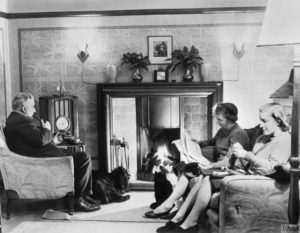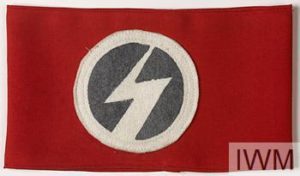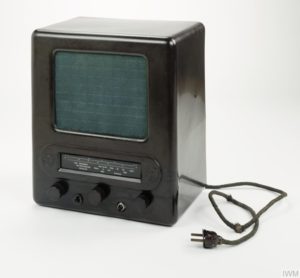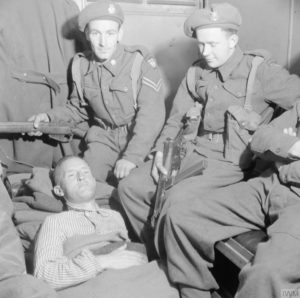William Joyce (‘Lord Haw Haw’) was a radio personality who broadcast German propaganda to the United Kingdom during the Second World War. Although initially popular with British audiences, his popularity declined as the war progressed.
‘Lord Haw-Haw and his popularity are outstanding in this propaganda and economic war. He has come to fill the foreground in much the same way that Hitler did to start with, as symbol and spokesman of Nazi Germany. He is worth considering in a little detail as the joint production of the German propaganda ministry and our own popular imagination’ (US: Mass Observation’s Weekly Intelligence Service, No. 9, 29 March 1940).
Thus began the opening paragraph of the 29 March 1940 issue of US, Mass Observation’s weekly intelligence service newsletter (quoted throughout). Ten days later came the German invasion of Denmark and Norway, followed the next month by the attack on the Low Countries. ‘The Phoney War’ had come to an abrupt end, and with its demise came also the end of Lord Haw Haw’s popularity and whatever influence he might have had with his British audience.
Yet for the first eight months of the Second World War, with relative inaction on the battlefronts, Lord Haw Haw (William Joyce) had enjoyed an audience sometimes reaching over 50% of the British listening public. And despite such rival claimants as ‘Tokyo Rose’ and ‘Axis Sally’ many would agree with journalist William L Shirer when he wrote in his End of Berlin Diary that Lord Haw Haw ‘had been the war’s outstanding radio traitor’.

HOME FRONT: A FAMILY AT HOME ON A SUNDAY AFTERNOON IN TAUNTON, SOMERSET, 1942
Listening to the radio was a popular pastime during the Second World War and radio broadcasts were an important source of news and information. The family in this photograph are engaged in different activities – listening to the radio, reading and knitting – at their home in Taunton, Somerset, in 1942
William Joyce was born on 24 April 1906 in Brooklyn, New York to Michael Francis Joyce (a naturalized US citizen since 1894) and his wife Gertrude Emily Brooke. In 1909 the family returned to their native Ireland, living at various addresses in Counties Galway and Mayo. Throughout the First World War Joyce’s father was a staunch supporter of the Allied cause, and in the ensuing ‘Troubles’ identified himself with the British establishment. Joyce later claimed to have served with the notorious ‘Black and Tans’ in ‘an intelligence capacity’.
With Partition in 1922, Joyce’s parents took refuge from expected retribution from Irish nationalists and moved to England. William had gone the previous December and, despite being under age, enlisted in the Worcestershire Regiment. His true age was eventually discovered and he was discharged. Passing the London Matriculation on 21 October 1922, Joyce applied for enrolment in the University of London Officer Training Corps (OTC), claiming falsely, ‘I was born in America, but of British parents’. This falsehood was confirmed by his father who wrote to the Adjutant of the OTC, ‘We are all British, not American citizens’.
Joyce enrolled into the OTC and wore its uniform on every conceivable occasion. He read English Language and Literature and History at Birkbeck College, gaining a First Class Honours Degree in 1927. On 30 April 1927 he married Hazel Kathleen Barr, by whom he had two daughters. Joyce’s temperament suited neither the role of husband nor of father and the marriage was dissolved in 1936. By then he had already embarked on full-time political career, joining firstly the British Fascists on 6 December 1923, and then the Conservative Party in 1928. In 1933, he became a member of the British Union of Fascists (BUF), founded by Sir Oswald Mosley the previous year.
BRITISH UNION OF FASCISTS (BUF) BRASSARD

Joyce soon became BUF West London Area Administrative Officer, then Propaganda Director in 1934, and finally Deputy Leader. In public Joyce called Sir Oswald Mosley ‘the greatest Englishman I have ever known’, but in private he inveighed against ‘The Bleeder’, whom he found insufficiently antisemitic and radical: ‘Mosley was hopeless. He was the worst leader of what should have been the best cause in the world’. Matters came to a head in the spring of 1937 when Mosley dismissed Joyce, who promptly established the National Socialist League. With its blatantly antisemitic and pro-Nazi programme, it attracted only a tiny membership. On 24 August 1939, with the crisis over German claims on Danzig and the Polish Corridor threatening war, Joyce renewed his passport and he and his second wife, Margaret, set out for Berlin.
In his book, Twilight over England, Joyce justified his action: ‘To me it was clear on the morning of 25th August that the greatest struggle in history was now doomed to take place. It might have been a very worthy cause to stay in England and incessantly work for peace, but I had traditionally acquired or inherited prejudice, which many will think foolish and which may be logically difficult to defend. England was going to war. I felt that if, for perfect reasons of conscience, I could not fight for her, I must give her up for ever. Such an argument I do not commend to anybody else, but man is guided by more than reason alone, and in this great conflict, I wanted to play a clear and definite part’.
This ‘clear and definite part’ came on 18 September 1939 when Joyce received a contract as a newsreader at the Reichsrundfunk (German Radio Corporation), a week after making his first broadcast.
Four days earlier, the radio critic for the Daily Express, Jonah Barrington, had written: ‘A gent I’d like to meet is moaning periodically from Zeesen [the German radio station beaming overseas broadcasts]. He speaks English of the haw-haw, damit-get-out-of-my-way variety, and his strong suit is gentlemanly indignation’. Barrington expanded this in the 18 September 1939 issue: ‘Jonah Barrington, listening at the “Daily Express” short wave station in Surrey to the war on the radio, introduces “Lord Haw-Haw”…from his accent and personality I imagine him with a receding chin, a questing nose, thin, yellow hair brushed back, a monocle, a vacant eye, a gardenia in his button hole. Rather like P.G. Wodehouse’s Bertie Wooster’.
Obviously this could not yet have been Joyce and it seems likely that the broadcaster Barrington heard was a German named Wolff Mittler. But the nickname stuck and was inherited by Joyce.
The broadcasts quickly became a major topic of popular interest. There was endless speculation as to the identity of the now famous ‘Lord Haw-Haw’. On 19 October 1939, News Review (a weekly magazine heavily inspired by Time) published a letter from a Mr A R Thomas of Bournemouth who asked: ‘Can you disclose the identity of the person (from his accent an Englishman) who broadcasts from Germany in English every evening on the short-wave transmitter D J A? I have listened to these broadcasts the last few evenings: the so-called “news” contained therein is such a tissue of disgusting lies that the result of listening is definitely nauseating, more particularly when one thinks, as it would appear to be the case, that it is an Englishman speaking……And what can have induced an Englishman, if he is an Englishman, to behave in such a sickening renegade manner?’ News Review incorrectly replied: ‘No Englishman is…”Lord Ha Ha” [sic], but a propagandist named Hoffman, who three years ago married a Manchester girl. Son of a wealthy tea importer, he worked for some year in USA now lives in Munich’.
THE GERMAN VOLKSEMPFÄNGER(‘PEOPLE’S RECEIVER’)
The German Volksempfänger (‘people’s receiver’) was part of a programme to make radio receivers cheaply available to the German public. The Nazi government recognised radio’s potential as a means of disseminating Nazi propaganda to millions of people and considered the widespread availability of receivers, such as the one pictured here, highly important.

News Review persisted in its claim that Hoffman was Lord Haw Haw even publishing his photograph in the 11 January 1940 issue. Six weeks later, on 7 March, it grudgingly admitted of Joyce ‘shortly before the war with Germany, he fled to Hitler’s Third Reich where he was said to have become one of the English-speaking radio announcers’.
Finally conceding defeat News Review published the following letter from M Kelly of Galway on 4 April 1940: ‘As one who knew Willie Joyce from the time he arrived in Galway (an infant) until he left rather hurriedly in 1922, I am quite certain that he is the 9.15pm and 11.15pm English announcer from Hamburg, Bremen, etc. Ever since those broadcasts started I was struck by the familiarity of that voice. I often mentioned that I heard that voice before but could not place it, but the minute I saw your photograph and read the paragraph, I knew at once it was Willie. Even as a small precocious child he had the same sneering, sarcastic venom when speaking of anything Irish or pertaining to Galway. He has not lost the “accomplishment” – rather it is more pronounced when criticising Mr Churchill. I have shown News Review to some of Willie’s schoolmates. Each had the same story of recognising “Lord Haw-Haw’s” voice but were puzzled by its familiarity’.
In the same issue there also appeared the following item: ‘Joyce’s brother Frank has been dismissed from his post as clerk of works to the BBC’s civil engineering department, which he had held for seven years. Said a Broadcasting House spokesman last week: “His alleged relationship had nothing to do with the termination of his appointment”‘.
By now Barrington’s Daily Express campaign to kill by ridicule had backfired. Lord Haw Haw had become the number one radio personality of the war. Smith’s Electric Clocks produced an advertisement with a drawing of monocle donkey at the microphone with the caption: ‘Don’t risk missing Haw-Haw. Get a clock that shows the right time always, unquestionably’. Likewise an advertisement in December 1939 for Philips radios printed details of the broadcasts from Zeesen and Hamburg. Impresario George Black put on a revue at the Holborn Empire which ran from December 1939 until the end of July 1940 with the title Haw Haw. Two other comedians, the Western Brothers, who specialised in ‘the old school tie’ act, introduced the song ‘Lord Haw Haw the Humbug of Hamburg’.
The BBC, on behalf of the Ministry of Information, and Mass Observation both undertook in early 1940 a special study of the effects of the German broadcasts. For British officials the surveys’ results were disturbing. At the end of January 1940, one out of every six adults was a regular listener, three were occasional listeners, and two never listened. At the same time, four out of every six people were listening regularly to the BBC News.
A number of reasons were put forward for this large audience. Fifty-eight per cent of those questioned listened ‘because his version of the news is so fantastic that it is funny’. A Canadian listener writing to London Callingon 25 November 1939 said ‘Whenever we are short of entertainment we tune in to that comedian. We often wonder whether he knows what a lot of laughter he causes’. A large percentage tuned in ‘because so many other people listen to him and talk about it’. A bricklayer’s labourer told one of Mass Observation’s reporters: ‘There’s a feeling you can’t turn off. You’ve got to listen to him’ (Mass Observation’s US).
Still others felt him to be a good broadcaster. A working-class woman in Lambeth replied: ‘I think he is very good. He’s very nice. We aren’t educated enough to understand all the words he uses, but he’s very interesting, and lot he says is true’ (Mass Observation’s US). Other interviewees reacted with even more enthusiasm: ‘He sounds such a nice man. It makes you think there must be something in what he says. I love him and his clever tricky sayings. I love his voice and manner and would love to meet him. I feel he is a gentleman and would be a nice friend – all my intuition and his voice…His talk on “Soon” was great and made me chuckle – true or not true. He is a great psychologist. Always he makes me happy’ (ibid., p 75).
But even more disturbing to the authorities were those listeners who tuned in ‘because they like to hear the German point of view’ and ‘because they hope to get more news’. These feelings were summed up by an RAF airman: ‘He talks a lot of cock and 75% of his statements are either lies or propaganda, but occasionally he hits the nail on the head. It’s then that he makes you think. You wonder whether a lot of his statements are also true’ (Mass Observation’s US). And a librarian: ‘We nearly always turn him on at 9.15 to try and glean some news that the Ministry of Information withholds from us. It is interesting to get the BBC’s views and the German wireless’s accounts of the same aerial engagements. Between the frantic eulogies of the BBC and the sneers of the German wireless one achieves something like the truth’ (Mass Observation’s US). A building worker was of the opinion ‘…both Haw-Haw and our own wireless are propaganda. They pick out one another’s weak points’ (Mass Observation’s US). It was the influence the broadcasts had on working class listeners that most worried the British government.
Almost equally disturbing to the BBC was the view of a Mr Heath quoted in Illustrated on 4 November 1939. ‘Lord Haw-Haw’ was, he said ‘funnier than anything the BBC ever put on’. Advice on how to combat Lord Haw Haw’s effectiveness was not slow in coming. Mr C N Edge of London wrote to Picture Post on 28 February 1940 offering this advice: ‘Could the BBC therefore be persuaded to give, each night immediately after Haw-Haw’s talk, a ten minute “Spot the Errors” item on the “Inspector Hornleigh” principle, with a run through of Haw-Haw’s speech, and then STOP. The announcer pointing out the errors or mis-statement?’
This suggestion had already been the subject of at least two internal memoranda at the BBC. Eventually, it was decided that the eminent lawyer Norman Birkett should go on the air (anonymously) to answer Lord Haw Haw. His first broadcast took place on 9 February 1940. Asa Briggs, in his history of British broadcasting during the war years, maintains: ‘Within the limits of his assignment, he proved as his biographer states, “an excellent booster for morale during the waiting period of the phoney war”. Yet he never won the good will of the critics, and the audience for one of his talks, at least, was said to consist mainly of “adolescents and middle-aged women”. His performance neither quietened those who demanded the lie direct to Haw-Haw, nor those who believed the answer to Haw-Haw was better entertainment’.
At the same time criminologist Edgar Lustgarten was recruited by the BBC to counter Joyce’s broadcasts to North America. He was Jewish, and the BBC decided that he could not use the surname Lustgarten. Under the pseudonym ‘Brent Wood’ he broadcast to the USA and Canada, often answering points that Joyce had made earlier in the evening. In 1975, Lustgarten still considered Joyce ‘one of the best broadcasters ever’: ‘He had that sort of compulsion that you had to go on listening to him whether you liked what he was saying or not. For the job he was doing he could not have been surpassed’.
But even as Birkett and Lustgarten went on the air, Mass Observation were already recording a decline in listening – 10% of what were once regular listeners had stopped tuning in by March 1940. A variety of reasons were put forward for this. The first was that the novelty value had gone: ‘Recently I stopped listening to him on account of his consistent dullness. In the early days, because he was a novelty and the press gave him so much publicity, I used to listen regularly, but he is not worth the publicity he was given’ (Mass Observation’s US). Other listeners considered that Haw Haw was not supplying the news which people so badly wanted and which they felt they were not getting from the BBC or the British press: ‘I used to think he was dangerous to this country, but now I don’t think he is so. The more one listens to him, the less impressive he is. He fails to give the news, which is what we want. Long talks about the Boer War are just irrelevant’ (Mass Observation’s US).
Still more felt a growing resistance and annoyance not because what Joyce was saying was untrue, but because it might be true. This made people almost afraid of listening to him, because it made them feel bad, and led to dislike of his voice, personality and so forth. A Mass Observer asked ‘an aunt at Christmas what she thought of “Lord Haw-Haw” and she, a very patriotic Conservative woman said: “Oh, I don’t listen to him now. I am not going to be frightened by him. And it’s no use calling what he says rubbish, because there’s never smoke without fire!” And she thinks that everything in Germany’s bad’ (Mass Observation’s US). Another correspondent confessed: ‘I think that, secretly, we are rather terrified by the appalling things he says. The cool way he tells us of the decline of democracy and so on. I hate it: it frightens me. Am I alone in this? Nobody has confessed as much to me’ (Mass Observation’s US). Novelist Sydney Horler on the other hand recorded ‘After five minutes or so I had to switch off…I wanted to pick up a heavy poker and smash the radio into tiny pieces’ (Mass Observation’s US).
Events in Europe were about to overshadow the radio propaganda war. With the German conquest of France, he changed his tactics and made direct appeals to the British to surrender to the Nazis for their own good. American radio correspondent Harry W Flannery, encountering Joyce in Berlin during the winter of 1940, noted in his Assignment to Berlin : ‘His first broadcasts had been witty, but as he remained in Germany, he had begun to sour. He had lost his sense of humour and with it, I believe, what influence he might have had’.
Joyce’s last broadcast was made from Hamburg on 30 April 1945, the day of Hitler’s suicide: ‘And now I ask you earnestly, can Britain survive? I am profoundly convinced that without German help she cannot’. Germany surrendered to Allied forces a week later. Hiding near the Danish border with false papers, Joyce gave himself away to two British officers out on a wood-gathering expedition, one of whom shot Joyce in the leg suspecting he was armed. Joyce was brought back to Britain and tried for treason. He was found guilty and executed at Wandsworth prison on 3 January 1946.
THE ARREST OF WILLIAM JOYCE (“LORD HAW HAW”)IN GERMANY, MAY 1945

William Joyce, known as ‘Lord Haw Haw’, lies in an ambulance after his arrest by British officers at Flensburg, Germany on 29 May 1945. He was shot during the arrest. ‘In civilised countries wounded men are not peep-shows’, Joyce snapped when this series of photographs was taken at Second Army Headquarters, en route to Lüneburg military hospital.

Commenti recenti